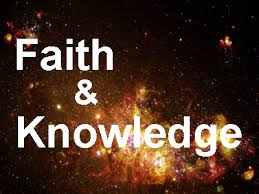
From the last blog post, ‘Faith is not about Seeing then believing, it’s really the other way around. It’s about Believing then seeing.’
It is not true that we need evidence and proof before we consent to believing, let alone trusting, in something or someone. As a therapist I see this in couples whose trust has been compromised or broken. One will say ‘I need proof or evidence before I can trust again.’ As logical and as reasonable as that proposition may appear, you can place that statement right behind the Chupacabra and the Sasquatch, in the parade of ‘Ridiculous things people believe even when there is absolutely no evidence, or when the only evidence works to negate such a belief.’ In the end, it is not evidence that convinces us, it is hope.
Have you ever experienced such a phenomenon? There are people who believe in something so strongly that it doesn’t matter what anyone says, nothing will sway them in their belief. I find that perturbing don’t you? Well, you should! Haha! Faith, whether it’s trust or mental assent, sometimes defies logic and reason. Blaise Pascal, the well-known 17th cent. mathematician said, ‘The heart has its reasons of which reason knows nothing.”
We ‘believe’ in our children when they have done nothing to instill such confidence in us. We ‘trust’ those who hurt us again and again, because we desperately long for the kind of relationship we envy in others. More often than not, we ignore our doubts, put aside the reasons, suspend our judgment and embrace things that do not make any sense, not because we have evidence but in spite of its absence.
Most Christians erroneously think that faith is based on knowledge. It is not. The truth is we don’t know very much about the Bible, if we know anything at all. But if our faith and spirituality were based on evidence or facts, it would cease to be faith and become a branch of science. Pascal, in the same breath as the quote above also said, ‘and it is the heart that knows God, not reason.’
Don’t think that some Christians haven’t tried to quantify spirituality. They have and failed, just as scientists have tried and failed to quantify. Spirituality is just not quantifiable. How do you place a value or a position on love? How much do you love your spouse, or child, or pet? We can’t quantify our love, we can only qualify it. We believe in someone or something not because of the overwhelming evidence telling us it’s safe to believe. We believe because it gives us hope.
Have you ever heard anyone give a definitive quantifiable answer to the question ‘Does God exist?’ Some claim they can but they don’t know what they’re talking about. Stay away from such people. Like anybody else, they can only qualify their answer, as is their prerogative, by merely saying that they do or do not believe. But the popular Christian position is that anyone who is uncertain of his commitment to these unquantifiable assertions is weak in his faith, faithless. In this culture, doubt is synonymous with weakness.
But doubt is not weakness. It is a natural part of having faith. The nature of faith, (pistis), is that we hope for or trust in, God. We don’t believe in God because we know he’s there. No one knows that, even if some vehemently claim that they do. We believe in God hoping and trusting that he is there, in spite of our doubts and fears.
There was a man once who came to Jesus for the healing of his son who was epileptic (Mark says he was demon possessed because he didn’t know that epilepsy was a medical condition, Mk 9:14-29). When Jesus’ disciples couldn’t help the young man, Jesus became frustrated and ordered the boy to be brought to him. The father cried,
“Have mercy on us and help us, if you can.”
“What do you mean, ‘If I can’?” Jesus asked. “Anything is possible if a person believes.”
The father instantly cried out, “I believe, help thou my unbelief!”
It’s the need, desperation, and desire of hope, from which faith is born. In a chaotic world where hope is rare, faith gives us a taste of it. Some search for hope in money and possessions, some in their posterity, some in science, while others search for it in God. In trust, we look to God that we will be given more than a taste but a banquet table’s worth of hope. That’s why we believe.